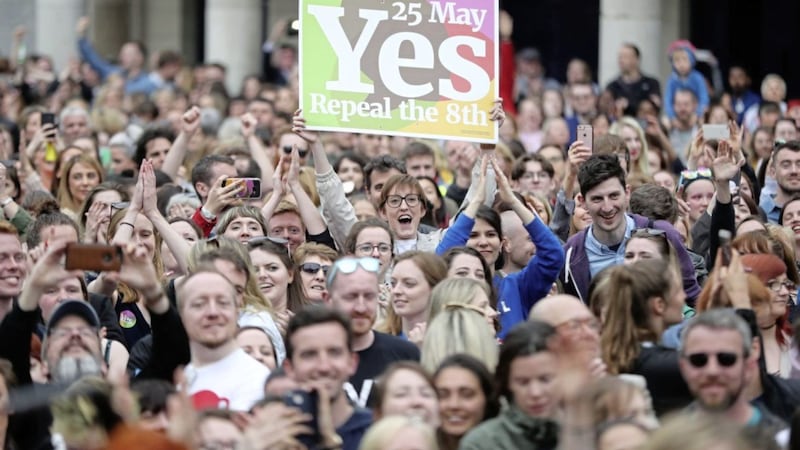Awesome and emphatic is how I would describe the result in the repeal referendum in the south.
The Yes vote was an exercise in human liberation at the ballot box, by women and men, of all ages and all walks of life, rural and urban, on behalf of women and society.
The result was a fundamental affirmation that the old order, where women’s lives were controlled by laws which no longer made sense – if they ever did - was swept away in a tsunami of respect.
The result was about the right of women to choose; to govern their own bodies. It was a vote that said we trust women in the choices they face and make, in the privacy of their own heads with the help of loving others around them.
It was a woman’s emancipation movement, named ‘Yes Together’ which blended civic society, gender and political parties but was not party political.
It was single issue driven, open-ended, popular and opportune; where party interests morphed into women’s interests.
The Eighth Amendment was a human rights issue that got lost in the mists of time and the mire of narrow, religious uncaring politics; where it became an unassailable moral force that was beyond rational and reasonable debate and persuasion.
The vote was a public exercise in restoring compassion to society at the very point where it was most needed, at the point where life begins; at the point of contact between the mother and the child in the womb.
I watched in disbelief and joy as RTE’s exit poll announced the awesome and emphatic will of the people.
It was a deeply emotional moment, which the experienced journalists struggled to explain. No one saw it coming with such commanding force and authority.
I thought of my late mother, who had ten children, and the many women I met over the decades, who campaigned for or argued for the right of women to choose.
I reflected back on those arguments and wondered why when I heard the phrase, ‘woman’s right to choose’ I heard ‘abortion on demand’.
And why now, in the face of this momentous and overwhelming decision I heard only, ‘the right to choose’.
I was 13, it was 1967. I heard my mother say to my late father that the mother’s life came first when life and death decisions had to be made. She was clear about that. Voices were not raised. It was a matter of logic. What would happen to a family, to the children, if the mother was not there?
My parents were devout Catholics. We were raised to be devout.
Faith mattered to them. It made sense of their and our lives. It brought order and structure and values of decency, compassion and caring. It gave them resilience to carry on in the face of daily grinding poverty. It respected them and us in a society which disrespected us because we were Catholics and connected to a national identity, however tenuous.
It was a faith which dove-tailed with the human spirit and was malleable to allow (but not permit) personal choice. The pulpit was one place. Faith was another and faith is where people like my parents lived and raised families.
It was the place where faith and private conscience coalesced and made it easy for my mother and Catholics, generally, to be devout and recognise the special place of the mother.
And it was in that space, as life modernised, that Catholics could decide for divorce and contraception and marriage equality and eventually abortion and remain true to their religious beliefs.
The institutional Catholic Church might insist on dotting the ‘i's’ and crossing the ‘t’s' but the popular church managed the ambiguity.
But the enormity of the Yes vote has removed the ambiguity. People of all faiths and none ensured that.
It also removed partition as the marriage equality Yes vote did in 2015.
Within hours of the repeal decision protesting women were on the streets of Belfast demanding change to the restrictive abortions laws.
Within days thousands of people were protesting on the streets of Belfast city centre for marriage equality.
The suffocating hand of the DUP will be unable to stop the tide of change, which is embedded in the north as it is the south.
It is waiting its turn.








